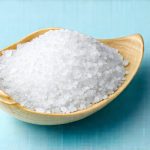Bloating after meals is an incredibly common experience, often dismissed as simply “part of life.” However, when bloating consistently follows consumption of sodium-rich foods, it signals something more specific is happening within the body. It’s not always about how much sodium you’re consuming in one sitting, but rather how your individual system responds to it, and what other factors are at play. Understanding why this occurs requires delving into the complex interplay between sodium, fluid balance, digestion, and even gut health. Many individuals experience mild, temporary bloating after salty meals without significant issue, while others find it debilitating, impacting their daily lives. This article aims to unpack the mechanisms behind post-meal bloating triggered by excessive sodium intake, exploring potential causes, management strategies, and when seeking professional advice is crucial.
The sensation of bloating isn’t simply about feeling ‘full’. It’s a subjective experience characterized by abdominal distension, often accompanied by discomfort, gas, or even pain. Sodium plays a critical role in regulating fluid balance within the body; it attracts and holds water. When you consume a meal high in sodium, your body naturally attempts to maintain homeostasis – a state of internal equilibrium – by drawing more water into the bloodstream. This increased blood volume can lead to temporary water retention throughout the body, including the digestive system. It’s this shift in fluid dynamics that often manifests as bloating, particularly if the digestive process is already somewhat sensitive or compromised. The feeling isn’t necessarily due to an excess of food volume so much as a change in where fluids are distributed within the body. Considering how hydration-timed meals can help with these processes might be useful.
Sodium and Fluid Retention: The Core Mechanism
Sodium chloride, commonly known as table salt, is essential for numerous bodily functions – nerve transmission, muscle contraction, and fluid balance being paramount. However, modern diets frequently contain far more sodium than our bodies strictly require. Processed foods, restaurant meals, and even seemingly innocuous items like bread can contribute significantly to daily intake. When the kidneys are overwhelmed by a sudden influx of sodium from a large meal, they may struggle to efficiently excrete it, leading to water retention. This isn’t necessarily a sign of kidney dysfunction; it’s a natural physiological response. However, the resulting fluid buildup in the gut can cause discomfort and bloating. If you often feel full after small meals, exploring screening options might provide valuable insights.
The extent of bloating varies significantly between individuals. Factors such as hydration levels, kidney function, overall health, and pre-existing digestive conditions all play a role. Someone consistently well-hydrated might experience less pronounced bloating than someone who is chronically dehydrated, as their kidneys are better equipped to handle the sodium load. Similarly, those with underlying issues like Irritable Bowel Syndrome (IBS) or Small Intestinal Bacterial Overgrowth (SIBO) may be more susceptible to bloating from even moderate increases in sodium intake because their digestive systems are already prone to sensitivity and fluid imbalances. Understanding your individual tolerance is key.
Furthermore, it’s important to differentiate between acute water retention due to a single high-sodium meal and chronic edema – persistent swelling caused by underlying medical conditions. Post-meal bloating typically resolves within hours as the kidneys regain control of sodium levels. Chronic edema requires medical evaluation. Sodium’s impact isn’t isolated; it interacts with other electrolytes like potassium and magnesium, further influencing fluid balance and digestive function. An imbalance in these electrolytes can exacerbate bloating symptoms. Learning about the science behind this process could be helpful for managing symptoms.
Identifying High-Sodium Culprits
Pinpointing specific foods contributing to post-meal bloating can be challenging, as sodium is often “hidden” in unexpected places. Here’s a breakdown of common sources:
- Processed Foods: This is the biggest offender. Canned soups, frozen meals, packaged snacks (chips, crackers), and cured meats are notoriously high in sodium. Reading nutrition labels carefully is essential. Look beyond just “sodium” and pay attention to serving sizes – often, a single portion exceeds recommended daily allowances.
- Restaurant Meals: Restaurant food frequently contains significantly more sodium than home-cooked meals. Chefs use salt liberally to enhance flavor, and pre-made sauces and seasonings are often loaded with it. Asking for modifications (e.g., no added salt, sauce on the side) can help mitigate this.
- Condiments: Soy sauce, ketchup, mustard, salad dressings – even seemingly harmless condiments can contribute substantially to sodium intake. Using alternatives or limiting portion sizes is advisable.
- Certain Vegetables: While vegetables are generally healthy, some naturally contain higher levels of sodium than others (e.g., celery, beets). This isn’t usually a significant concern unless consumed in very large quantities.
A food diary can be incredibly helpful in identifying specific triggers. Track what you eat, when you experience bloating, and the severity of symptoms to pinpoint patterns. Don’t just focus on obvious salty foods; consider hidden sources as well. Being proactive about ingredient awareness is crucial. Planning for weekend recovery meals after overeating could help mitigate these effects.
The Gut-Sodium Connection: More Than Just Fluid Balance
The relationship between sodium and bloating isn’t solely about fluid retention. Growing research highlights the intricate connection between gut health and sodium absorption. A compromised gut barrier – often referred to as “leaky gut” – can lead to increased intestinal permeability, allowing more sodium (and other substances) to be absorbed into the bloodstream. This exacerbates water retention and contributes to inflammation, further intensifying bloating symptoms.
The gut microbiome – the vast community of bacteria residing in our digestive tract – also plays a role. An imbalance in gut bacteria (dysbiosis) can impair nutrient absorption, including sodium, and disrupt intestinal motility, leading to constipation or diarrhea, both of which can contribute to bloating. Certain bacterial strains are more adept at processing sodium than others; a healthy microbiome helps regulate this process.
Furthermore, sodium influences the function of the enteric nervous system – often called the “second brain” – which controls digestive processes. Excessive sodium intake can disrupt nerve signaling and impair gut motility, leading to slower digestion and increased gas production, both contributing to bloating. A healthy gut is paramount for optimal sodium regulation. Focusing on high-satiety meals designed with gut health in mind could be a good approach.
Strategies for Managing Sodium-Related Bloating
While completely eliminating sodium isn’t realistic or desirable, several strategies can help manage post-meal bloating:
- Hydration: Drinking plenty of water throughout the day helps your kidneys flush out excess sodium and supports overall digestive function. Aim for at least 8 glasses of water daily, adjusting based on activity level and climate.
- Potassium-Rich Foods: Potassium counteracts the effects of sodium, helping to regulate fluid balance. Include potassium-rich foods in your diet such as bananas, sweet potatoes, spinach, and avocados.
- Magnesium Intake: Magnesium also plays a role in fluid regulation and digestive function. Leafy green vegetables, nuts, seeds, and whole grains are good sources of magnesium.
- Probiotic & Prebiotic Support: Supporting gut health with probiotics (beneficial bacteria) and prebiotics (food for the bacteria) can improve digestion and sodium absorption. Consider fermented foods like yogurt or kimchi, or a probiotic supplement.
- Mindful Eating: Paying attention to portion sizes and eating slowly allows your body to better process food and reduces the likelihood of overwhelming your digestive system with a sudden influx of sodium.
It’s important to remember that these are general strategies; individual responses may vary. If bloating is severe, persistent, or accompanied by other symptoms such as abdominal pain, diarrhea, or weight loss, seeking medical advice is crucial. These could indicate an underlying medical condition requiring specific treatment. Don’t self-diagnose – consult a healthcare professional. Exploring one-skillet meals for easier digestion might also be beneficial. And remember that rebuilding digestive tolerance with gentle meals can have lasting benefits.


















